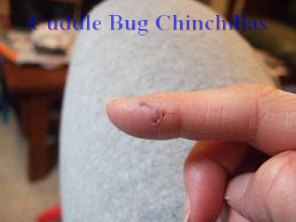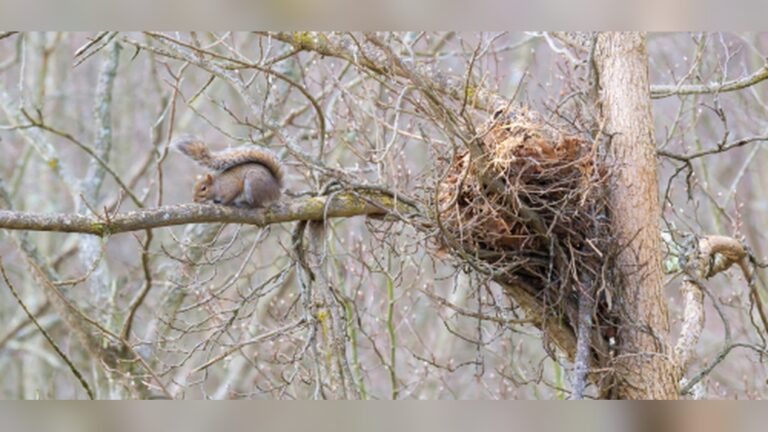Do Chinchillas Bite: Essential Facts Every Owner Must Know
Are you thinking about getting a chinchilla or already have one as a pet? You might be wondering, “Do chinchillas bite?”
It’s a common question because understanding your pet’s behavior is key to building trust and keeping both of you safe. Whether you’re worried about nips during playtime or curious about what triggers biting, this article will clear up all your doubts.
Keep reading to learn the surprising truth about chinchilla bites and how you can enjoy a happy, bite-free relationship with your furry friend.
Chinchilla Behavior Traits
Chinchillas have unique behavior traits that shape their daily actions. Understanding these traits helps owners care for them better. Knowing how chinchillas act can reduce worries about biting and other issues.
These small animals are gentle but cautious. They show their feelings through body language and sounds. Watching these signals helps you understand what they need or feel.
Natural Temperament
Chinchillas are usually calm and shy creatures. They enjoy quiet and safe environments. They do not seek attention like some pets but appreciate gentle interaction. Their nature is more about observing than playing loudly.
Common Reactions
Chinchillas react quickly to sudden movements or loud noises. They might freeze or run to hide. Sometimes, they may nip if scared or surprised. This is their way to protect themselves, not to attack.
Signs Of Stress
Stress in chinchillas shows through fur chewing or excessive hiding. They may also act restless or lose appetite. Watch for teeth grinding or unusual vocal sounds. These signs mean they need a calmer, safer space.

Credit: www.chewy.com
Reasons Chinchillas Bite
Chinchillas may bite for different reasons. Understanding why they bite helps you handle them better. Biting is often a way for chinchillas to express themselves. It is not always about aggression. Sometimes, they feel scared or uncomfortable. Knowing these reasons can improve your bond with your pet.
Fear And Anxiety
Chinchillas bite when they feel scared. Loud noises or sudden movements can cause fear. New environments or strangers may make them anxious. Biting is their way to protect themselves. They want to avoid danger. Calm and gentle handling helps reduce their fear.
Territorial Instincts
Chinchillas are territorial animals. They bite to protect their space. This is common if you touch their cage or favorite spot. They want to keep strangers away. Respecting their territory can prevent bites. Give them space and time to feel safe.
Health Issues
Pain or illness can make chinchillas bite. They may bite if they feel discomfort. Check for signs of sickness or injury. A visit to the vet is important. Treating health problems can stop biting caused by pain.
Mishandling
Rough or improper handling often causes biting. Chinchillas dislike being squeezed or dropped. They bite to show they are unhappy. Learn the right way to hold and pet them. Gentle and slow movements keep them calm.
Bite Severity And Frequency
Understanding chinchilla bites helps owners care for them better. Bite severity and how often chinchillas bite matters. It tells us about their mood and comfort. This section explains how strong chinchilla bites are and when biting happens more.
Typical Bite Strength
Chinchillas have small, sharp teeth. Their bite can pinch skin but rarely breaks it. The strength is mild compared to other pets. It can cause a small sting or scratch. Usually, a chinchilla bite is more surprising than painful.
When Biting Is Frequent
Chinchillas bite more if they feel scared or stressed. New or rough handling can cause more bites. They might bite during cleaning or if disturbed while resting. Frequent biting shows discomfort or fear. Gentle care and patience reduce biting habits.
Comparing Bites To Other Pets
Compared to dogs or cats, chinchilla bites are weaker. Dog bites can cause serious injury. Cat bites are deeper and can get infected. Chinchillas bite less often and with less force. They are less dangerous but still need careful handling.

Credit: smallpetselect.com
Preventing Bites
Preventing bites is important to keep your chinchilla happy and safe. Understanding their behavior helps avoid biting incidents. Gentle care and respect are key to good chinchilla handling.
Proper Handling Techniques
Hold your chinchilla gently but firmly. Support their body with both hands. Avoid grabbing their tail or fur. Move slowly to prevent startling them. Use calm voices to soothe your pet. Practice handling daily to build comfort.
Building Trust
Spend quiet time near your chinchilla. Offer treats by hand to encourage bonding. Let them approach you first. Avoid sudden movements or loud noises. Be patient; trust grows over time. Respect their space if they seem scared.
Safe Interaction Practices
Watch for signs of stress or fear. Stop handling if your chinchilla seems upset. Use toys to engage without touching. Keep play sessions short and calm. Always supervise children with chinchillas. Create a safe, calm environment for play.
Responding To A Bite
Chinchilla bites can surprise any pet owner. Knowing how to respond helps keep both you and your pet safe. Quick and calm actions reduce pain and risk of infection. Understanding proper care and training stops future bites.
Immediate Care Steps
Clean the bite area with warm water and mild soap. Use a clean cloth to gently pat dry. Apply an antibiotic ointment to prevent infection. Cover the wound with a sterile bandage. Watch for swelling, redness, or pus. These signs mean the bite may be infected.
Training To Reduce Biting
Notice what makes your chinchilla bite. Avoid those triggers during play or handling. Use gentle, slow movements to build trust. Offer treats to reward calm behavior. Never punish your chinchilla for biting. Consistent, patient training helps reduce biting over time.
When To Seek Veterinary Help
Visit a vet if the bite is deep or bleeding heavily. Seek help if swelling or redness grows quickly. If you see pus or smell a bad odor, get medical advice. Call a doctor if you feel fever or chills after a bite. Prompt care stops infections and protects your health.
Creating A Safe Environment
Creating a safe environment is key to having a happy chinchilla. These small animals feel secure when their space meets their needs. A calm, clean, and well-organized area helps prevent biting. Chinchillas are sensitive and can get scared easily. Their environment plays a big role in how they behave.
Ideal Cage Setup
The cage should be spacious with multiple levels for climbing. Use solid floors to protect their feet. Avoid wire floors that can hurt them. Place hiding spots inside the cage. Chinchillas need a quiet corner to feel safe. Keep the cage away from loud noises and direct sunlight. Clean the cage regularly to avoid bad smells and germs.
Enrichment And Exercise
Chinchillas need toys and activities to stay happy. Provide chew toys to keep their teeth healthy. Exercise wheels or safe play areas help burn energy. Bored chinchillas may bite out of frustration. Daily playtime outside the cage is also good. It keeps their mind active and reduces stress.
Minimizing Stress Factors
Avoid sudden loud noises around chinchillas. Keep pets and children calm near them. Stress makes chinchillas more likely to bite. Handle chinchillas gently and with patience. Keep a consistent routine for feeding and cleaning. A stable environment helps chinchillas feel secure and less aggressive.
Signs Of A Happy Chinchilla
Chinchillas show happiness in many subtle ways. Understanding these signs helps build trust and avoid bites. Happy chinchillas feel safe and relaxed. They enjoy their surroundings and the company of their owners.
Recognizing happy behaviors makes caring for chinchillas easier. It also creates a better bond between pet and owner. Here are clear signs that a chinchilla is happy.
Positive Body Language
A happy chinchilla has relaxed body posture. Their ears point forward, showing interest and calmness. Soft, gentle movements mean comfort and trust. They often sit with tails relaxed and eyes bright. Avoid stiff or tense postures that show stress.
Interactive Behaviors
Happy chinchillas seek attention and play. They may hop around and explore their space. Nuzzling or lightly nibbling your hand shows affection. They respond to your voice with curiosity. These actions mean they enjoy interaction and feel safe.
Indicators Of Comfort
Comfort signs include dust bathing and grooming themselves. A happy chinchilla sleeps peacefully in a cozy spot. They eat well and drink water regularly. Calm breathing and quiet sounds also show contentment. These signs mean your chinchilla feels secure and happy.

Credit: cuddlebugchinchillas.com
How Smart Pets Lover Can Help You with Do Chinchillas Bite
Turning Chinchilla Bites into Learning Moments
Understanding why chinchillas bite opens up valuable opportunities to deepen your bond and improve your pet care skills. For instance, recognizing the reasons chinchillas bite—like fear or overstimulation—helps you respond calmly and create a safe environment where your furry friend feels secure. This kind of attentive care aligns perfectly with the thoughtful approach we champion at Smart Pets Lover, where every wag, purr, and chirp tells a story.
When you notice signs of discomfort or agitation, you can use these moments as practical lessons in patience and empathy. Learning to read your chinchilla’s body language not only prevents bites but also nurtures a happy, trusting relationship. If bites do occur, reflecting on your responses and adjusting your handling techniques ensures that both you and your pet grow together.
- Observe behavioral cues before handling
- Practice gentle interaction and positive reinforcement
- Maintain a calm and predictable routine
If you’re ever unsure about bite severity or how to improve your chinchilla’s comfort, reaching out to experienced pet care communities or veterinarians can provide reassurance and tailored advice. After all, responsible pet ownership is about staying informed and connected—just like we support at Smart Pets Lover.
Frequently Asked Questions
Do Chinchillas Commonly Bite Their Owners?
Chinchillas rarely bite if they feel safe and comfortable. Biting usually happens when they are scared or stressed. Proper handling and gentle interaction reduce the chances of biting. They are generally gentle pets with calm temperaments.
Why Do Chinchillas Bite Sometimes?
Chinchillas bite to express fear, pain, or stress. New environments, loud noises, or rough handling can trigger biting. Understanding their body language helps prevent bites. Patience and trust-building improve their comfort and reduce biting incidents.
Can A Chinchilla Bite Cause Infection?
Yes, chinchilla bites can cause infections if untreated. Their teeth carry bacteria, which may enter wounds. Clean any bite immediately with soap and water. Consult a doctor if swelling or pain occurs.
How To Prevent Chinchilla Biting?
Handle chinchillas gently and regularly to build trust. Avoid sudden movements or loud noises around them. Provide a calm environment and proper care. Respect their boundaries and watch for signs of discomfort.
Conclusion
Chinchillas may bite, but it is not common. They bite mostly when scared or hurt. Gentle handling helps prevent biting. Understanding their behavior builds trust over time. Patience and care create a happy pet. Remember, every chinchilla is unique in personality.
Treat them kindly for a friendly bond. Keep learning about their needs and signals. This makes living with chinchillas more enjoyable. Biting should not stop you from loving them.







